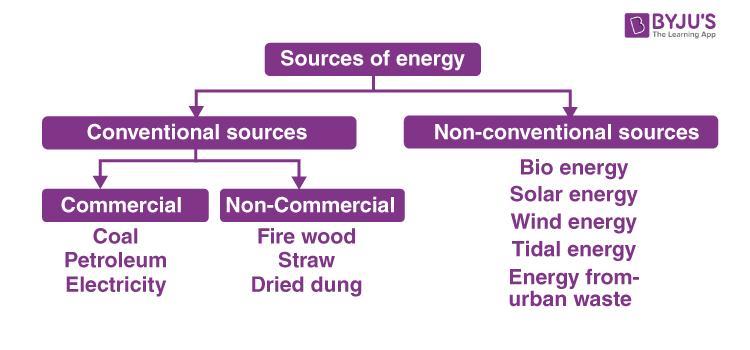Explain Differences Between Conventional and Non Conventional Energy Sources
Natural resources like wind tides solar biomass etc generate energy which is known as Non-conventional resources. These sources of energy are in limited quantity except hydro-electric power.

Non Conventional Sources Of Energy Meaning Types Advantages
The conventional sources of energy are fossil fuel CNG coal oil natural gas.

. The conventional sources of energy are generally non-renewable sources of energy which are being used since a long time. When we cannot reuse a source of energy after using it once we call them conventional sources of energy or non-renewable energy resources. Non-Conventional sources of Energy are recently discovered sources of energy.
They have been in use since a long time. The costs associated with installing solar panels on a residential home are high and power rates are often more expensive than conventional sources average rate of 122 cents per kWh for solar vs. Non-conventional sources of Energy.
Production and transportation cost. The difference between conventional and unconventional is relatively straightforward and has to do mostly with the ease the fuels can be extracted with. B Non conventional energy sources.
The conventional energy sources discussed above are exhaustible and in some cases installation of plants to get energy is highly expensive. 100 cents per kWh for electric. There are three main categories of energy sources.
Conventional energy on the other hand is based on fossils and hence these are possibly going to be extinct quite soon. Conventional sources of Energy have been used since a long time. Certain energy resources have a longer renewal time than others.
Large amounts of electrical power can be produced through the use of conventional technology. While oil can be different based on the method of extraction oil processing methods and separation are the same. Fossil fuels formed over millions of years ago as dead plants and animals were subjected to extreme heat and pressure in the earths crust.
These are of various types depending on their sources. However solar power prices continue to fall and this form of energy offers other advantages. As the conventional sources of energy are limited in nature and their formation takes millions of years they can be exhausted one day.
For example firewood and coal have been in use since a long time. Conventional oil or gas comes from formations that are normal or straightforward to extract product from. They are common and widely used sources.
At the same time it is becoming increasingly difficult to discover and exploit their new deposits. Availability and renewal times. These sources of energy are being used extensively in such a way that their known reserves have been depleted to a great extent.
Conventional sources of energy eg. 9 rows Conventional sources of energy. While unconventional methods have grown more prominent over the past several years conventional oil methods are still used.
Conventional energy sources are a non-renewable source of energy. These are pollution free and hence we can use these to produce a. Conventional sources of energy are the natural energy.
Solar and wind energy are renewable sources of energy. These sources of energy are also called non renewable sources. Those energies that are continuously being formed in nature are termed nonconventional energy or also called renewable energy sources.
Oil is the most widely used source of energy. By comparison the lowest cost conventional technologies were gas combined cycle technologies averaging 74 per megawatt-hour and coal plants averaging 109. These are further classified as commercial energy and non-commercial energy.
Non-renewable energy includes fossil fuels such as coal and petroleum. Renewable resources include sunlight water wind and also geothermal sources such as hot springs and fumaroles. They are relatively new and hence are not widely used.
Most renewable resources have low carbon emissions and low carbon footprint. They are the most important conventional sources of energy. Renewable is sometimes but not always included under alternative.
The differences between conventional and non-conventional energy sources are as follows- The main difference between conventional and non conventional sources of energy is that the former is non renewable and the later is renewable. In order to meet the energy demand of increased population the scientists developed alternate nonconventional natural Resources sources of energy which should be renewable and provide. Onshore wind has the lowest average levelized cost in this analysis at 59 per megawatt-hour and utility-scale photovoltaic plants werent far behind at 79.
Fossil fuel alternative and renewable. These sources have recently developed and are. These include coal petroleum natural gas and nuclear energy.
The sources of energy are of following types. Conventional Sources of Energy. Non-conventional sources of energy eg.
Despite the terms conventional and unconventional oil refers to the method of oil extraction. Alternative energy is normally produced by harnessing the natural world around us and the. Two Main Sources of Energy.
Renewable and non-renewable sources. Because of our large towns and cities and large populations many believe that conventional technology is the only way to produce enough electricity for us all. Conversely non-conventional sources of energy are the sources that are in abundance in the environment and are easily renewable so they are inexhaustible.
There are three main differences between both source types. Coal petroleum and natural gas are non-renewable sources of energy. Resources used to produce energy are classified into two main categories.
Example - Solar cells are still not widely used.

Conventional Sources Of Energy And Non Conventional Source Of Energy

Difference Between Conventional And Non Conventional Sources Of Energy With Comparison Chart Key Differences

Non Conventional Sources Of Energy Meaning Types Advantages

Non Renewable Vs Renewable Resource Venn Diagram Renewable Sources Of Energy Energy Sources Renewable Sources
No comments for "Explain Differences Between Conventional and Non Conventional Energy Sources"
Post a Comment